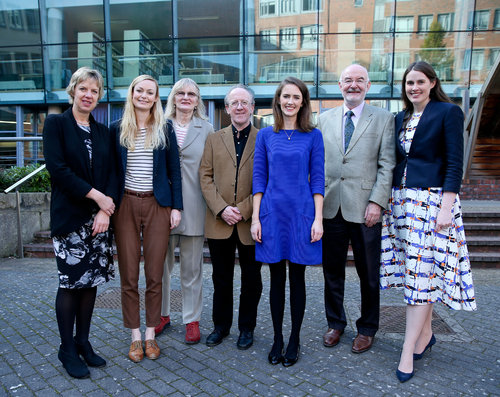Public Interest Litigation: Does it work?
16 October 2015

Pioneers in public interest litigation spoke at a seminar today (16 October 2015) at Dublin Institute of Technology examining the social impact of public interest litigation and barriers people experience in accessing justice.
The seminar, titled Public Interest Litigation: Does it work?’ addressed the difficulties in accessing justice and taking cases of major social importance. Speakers included Dr Lydia Foy, a transgender rights champion who took landmark legal proceedings which led to the passing of the Gender Recognition Act 2015, and Maeve O’Rourke BL, who has provided pro bono legal assistance to the Justice for Magdalene advocacy group, which represents those seeking reparation for the abuses suffered at the Magdalene Laundries.
Also speaking at the event was solicitor Kevin Brophy, who has worked on a number of equality cases including that of Senator Katherine Zappone and Dr Ann Louise Gilligan in their attempt to have their marriage recognised in Ireland.
Other speakers included Professor Gerry Whyte of Trinity College Dublin, who has published extensively in the areas of public interest law and constitutional law, and Rachel Power, Manager of the Public Interest Law Alliance (PILA), who talked about the role of NGOs in taking and supporting public interest law cases. PILA’s parent organisation, FLAC, represented Dr Foy throughout her landmark case for recognition.
The seminar is part of a series organised by Dr Mary Rogan, Head of Law at Dublin Institute of Technology, and Professor Ivana Bacik, Trinity College Dublin in conjunction with the Public Interest Law Alliance.
The series is funded by the Irish Research Council and seeks to examine the connections between law and social change in Ireland. Previous seminars have explored the connections between women’s rights, LGBT rights, immigration and asylum and social change in Ireland.
Dr Mary Rogan, Head of Law at Dublin Institute of Technology commented: ‘The Changing Ireland, Changing Law’ series has highlighted the many barriers people face when seeking access to justice. We have heard the stories of courageous and tenacious litigants, lawyers who support people to vindicate their rights, and the NGOs who work to reform the systems which create the conditions for these cases. It is an honour to work with the Public Interest Law Alliance as our lead partner on this project, which has done so much to highlight and support public interest litigation in Ireland’.
Rachel Power from PILA commented: ‘Today’s seminar demonstrated the range of activity that is necessary to create the space and conditions for potential cases to emerge and for them to be successful, and the need to understand social change in broad, complex terms. As embodied in the ‘Changing Ireland, Changing Law’ project itself, it was ever apparent the depth that collaboration and partnership brings to implementing tangible change on the ground.’
/ENDS
Notes for Editors:
- Changing Ireland, Changing Law is a joint DIT/TCD legal research project organised by Prof. Ivana Bacik (Law School, TCD) and Dr. Mary Rogan (DIT Law) in partnership with the Public Interest Law Alliance (PILA), the National Women’s Council (NWCI), the Gay & Lesbian Equality Network (GLEN) and the Immigrant Council of Ireland (ICI).
- This seminar series aims to explore the relationship between legal action and social change, and to promote debate on how public interest litigation has influenced or contributed to social change in Ireland, on a range of issues. The project is funded by the Irish Research Council, along with additional contribution from the Trinity College Dublin Equality Fund and Arts & Social Sciences Benefactions Fund. Today’s event is the last in the series.
- Dr Lydia Foy took a groundbreaking case, stretching over almost two decades, that paved the way to this year’s Gender Recognition Act. Throughout her case she was represented by FLAC (Free Legal Advice Centres). She this week received European Citizens Prize 2015 in recognition of her courage and conviction in a gala event at the European Parliament in Brussels. Read more on her case at http://www.flac.ie/publications/briefing-note-on-foy-case/
- Public Interest Law Alliance (PILA): PILA is a public interest law network that seeks to engage the legal community and civil society in using the law to advance social change in Ireland. PILA operates a Pro Bono Referral Scheme that connects social justice NGOs and community organisations with pro bono legal assistance. More at www.pila.ie
- Brophy Solicitors: Brophy Solicitors is a leading rights-based Dublin law firm specialising in legal advice and assistance for individuals and small businesses. Brophy Solicitors has acted in many landmark cases involving immigration and miscarriages of justice. More at www.brophysolicitors.ie
- Justice for Magdalenes: JFM is a group that seeks justice for the women formerly incarcerated in the Magdalene Laundries in Ireland. Maeve O’Rourke CL co-authored JFM’s submission to the UN Committee Against Torture, and to the UN Committee on Economic, Social & Cultural Rights as well as the Human Rights Committee. More at www.magdalenelaundries.com